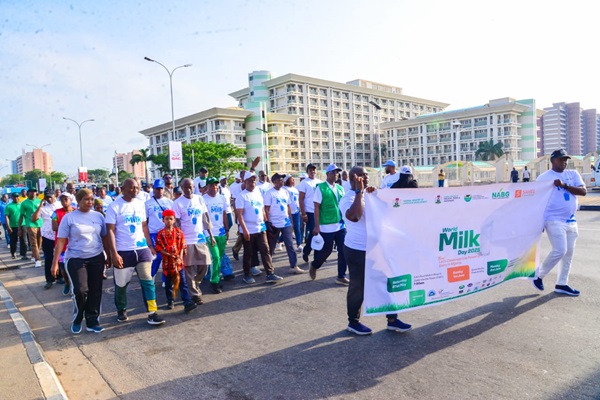
As Nigeria joins the rest of the world to commemorate World Milk Day (WMD) 2025, the Minister of Livestock Development, Idi Maiha has outlined strategies to support milk production and strengthen Nigeria’s dairy sector.
Speaking during a press briefing at the weekend in Abuja to mark the global event set aside by the Food and Agriculture Organisation of the United Nations (FAO), themed “Let’s Celebrate the Power of Dairy,” the minister stated that the strategies aim to close the shortfall of the remaining 65 per cent milk consumption deficit worth over $1.5 billion in annual imports.
“Nigeria consumes approximately 1.7 million metric tonnes of milk annually, yet we produce only about 600,000 metric tonnes locally, covering just 35 percent of national demand. The remaining 65 percent, worth over \$1.5 billion, is imported, mainly in powdered form. This dependence weakens our economy, drains foreign reserves, and limits local industry growth,” he pointed out.
Maiha observed that despite the $1.5 billion capital flight lost annually to milk importation, Nigeria still ranks low in milk consumption, far below the World Health Organization’s (WHO) recommended annual intake of 210 litres per person. He noted that Nigeria’s average stands at just 8.7 litres, compared to the African average of 40 litres.
“Our indigenous cattle breeds, primarily managed by pastoralists, yield an average of 1–2 litres of milk per day, compared to purebred or exotic breeds like Friesians or Jerseys, which can produce over 20–30 litres daily under proper management. India, the world’s largest milk producer, has surpassed 200 million tonnes annually, primarily through smallholder farmers backed by investments in animal health and breeding technologies. And closer home, South Africa processes over 3 billion litres of milk annually. These are examples Nigeria can emulate with focus and commitment,” he said.
Listing government interventions, Maiha noted that since the establishment of the Federal Ministry of Livestock Development, it has made bold moves to address the core challenges facing the dairy value chain.
He highlighted some of these interventions, including the launch of the National Livestock Growth Acceleration Strategy focused on 10 pillars. These include livestock value chain development, feed and fodder development, animal health and zoonoses control, livestock extension, youth and women empowerment, access to finance and insurance and water resources management—all critical to milk production.
He further said the ministry has registered eight pasture species (the first in 48 years) and developed and validated the National Strategy and Action Plan on Animal Genetic Resources, with support from the FAO. This plan outlines the country’s path to breed improvement, an essential step toward ensuring high-yield dairy animals that can compete globally.
“We are upscaling vaccine production at the National Veterinary Research Institute (NVRI) from the current 120 million doses of livestock vaccines to an annual capacity of 850 million. We are also expanding veterinary services to underserved rural communities, investing in cold chain infrastructure to maintain vaccine efficacy, and applying the One Health approach. We have commissioned a solar-powered vaccine storage facility with a 40-million-dose capacity in Sheda, Abuja, under the Livestock Productivity and Resilience Support Project (L-PRES). Additionally, the Wase Livestock Village has been inaugurated as a model for rehabilitating 417 grazing reserves, providing pastoralists with modern infrastructure to improve milk production and reduce the need for long-distance grazing.
“In addition to our focus on thousands of smallholder farmers and local commercial players such as L\&Z and Sebore, we are creating an enabling environment for large corporations to operate freely in Nigeria. We have commissioned a dairy training centre in Paikon Kore, Gwagwalada, in collaboration with Nestlé Nigeria, to build middle-level manpower and train farmers to improve their productivity using modern practices,” he stated.
Maiha added that the ministry is working towards convening the inaugural National Council on Livestock Development before the end of the year. The council will serve as the apex platform for policy deliberation, harmonisation and review in the livestock sector. It will bring together key stakeholders including state governments, development partners, private sector players, researchers and pastoralist communities to shape a unified national agenda for sustainable livestock development.


